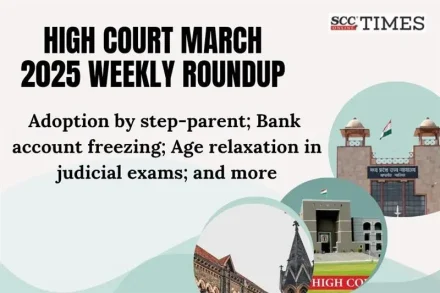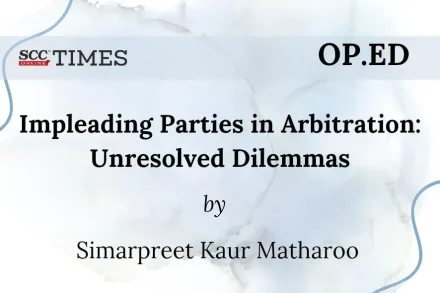
HIGH COURT MARCH 2025 WEEKLY ROUNDUP | Adoption by step-parent; Bank account freezing; Age relaxation in judicial exams; and more
A quick legal roundup to cover important stories from all High Courts this week.

A quick legal roundup to cover important stories from all High Courts this week.

Amit Malviya had filed a criminal defamation complaint before the Patiala House Court against Santanu Sinha, a Rashtriya Swayamsevak Sangh (‘RSS’) member, regarding Facebook posts made by him.

The jurisdiction available to this Court under Article 227 of the Constitution is primarily in the nature of superintendence and accordingly the Letters Patent Appeal will not lie in the instant matter.

The statutory mandate under Section 23 of the JJ Act must be strictly adhered to, ensuring that children in conflict with law are not subjected to joint proceedings with adults, regardless of whether they are being tried under the procedure applicable to adults.

In criminal jurisprudence, the standard of proof required to sustain a conviction is proof beyond a reasonable doubt, which is significantly higher than the preponderance of probabilities applicable in civil cases.

Since the Call Detail Records and location data have only been ordered to be preserved and not disclosed, there is no basis for the petitioner’s apprehension that this would provide an undue advantage to the defence. The direction simply ensures that potentially relevant evidence is not lost due to automatic deletion.

On perusal of the arrest memo shows that though there is column providing for ‘reasons of arrest’ against which it is stated “for the purpose of fair investigation” but neither there is column for ‘grounds of arrest’ in the arrest memo nor it is the case of the prosecution that the ‘grounds of arrest’ were separately served upon the present petitioner at the time of his arrest.”

The act of the defendants of playing the sound recordings in their restaurants/bars, for which the plaintiff holds the copyright would, on a prima facie view, amount to infringement of the plaintiff’s copyright in terms of Section 51 of the Copyright Act, 1957.

It is unfortunate that despite directions from Supreme Court and this Court, the trial has not yet concluded. This was unacceptable, considering that such directions were passed while disposing of the bail application, and the accused is in judicial custody for over 10 years. Such prolonged delay in compliance with judicial directions defeats the very purpose of directing expeditious trial.

Public transport, which is meant to ensure mobility and independence, instead became a site of fear and vulnerability for the victim, and any undue leniency to an accused caught at the spot, may embolden any future for perpetrators.

Upon careful comparison of the plaintiff’s trade dress and that of the defendants, it became apparent that the overall colour scheme, get-up and layout of the defendants’ impugned packaging is nearly identical to that of the plaintiff’s trade dress.

The Court held that Moonshine had demonstrated a prima facie case for a grant of injunction, the refusal of which would cause an irreparable loss to it.

While this court does not fault the Trial Court for attempting to proceed with the trial expeditiously, but, denying to the petitioner (‘accused’) the right to cross-examine the Head Constable on an issue which is critical to his defence appears to have been a disproportionate sense of expedition.

The plaintiff averred that given the widespread sale, promotional and advertising activities undertaken by the plaintiff, the registered trade marks has become the single source identifier of the plaintiff and its goods and services.

While the legal age of consent is important for protecting minors, the adolescents should be allowed to express their feelings and engage in relationships without fear of criminalization. The focus of the law should be on preventing exploitation and abuse rather than punishing love.

The appellants cannot seek condonation of such colossal delay under the pretext of professional misconduct of their previous counsel. It is not only the colossal length of delay; it is the unacceptable explanation of the delay, which must be discarded.

The arbitration would take place under the aegis of the Delhi International Arbitration Centre and would abide by its rules and regulations.

Such matters are now filed in the heat of the moment on advice of counsel by exaggerating and misconstruing actual events. However, this does not mean that genuine cases of harassment didn’t exist, and it is not blind to the ground reality of the deeply rooted social evil of greed for dowry.

by Simarpreet Kaur Matharoo*

Forcing the parties to file a written statement or to complete the pleadings during the process of mediation will prevent the parties in freely communicating with each other, which they have not been able to do since the dispute started.